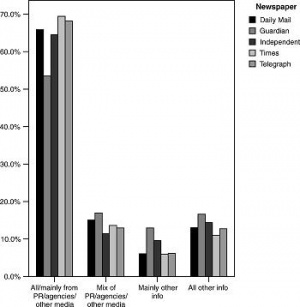Difference between revisions of "The Telegraph"
(New page: The Daily Telegraph is a UK based national newspaper published by Telegraph Media Group<ref>Telegraph Media Group, [http://www.guardian.co.uk/media/telegraphmediagroup Media A-Z], ''T...) |
|||
| Line 1: | Line 1: | ||
| − | |||
The Daily Telegraph is a UK based national newspaper published by [[Telegraph Media Group]]<ref>Telegraph Media Group, [http://www.guardian.co.uk/media/telegraphmediagroup Media A-Z], ''The Guardian'', Accessed 09-May-2009</ref>. | The Daily Telegraph is a UK based national newspaper published by [[Telegraph Media Group]]<ref>Telegraph Media Group, [http://www.guardian.co.uk/media/telegraphmediagroup Media A-Z], ''The Guardian'', Accessed 09-May-2009</ref>. | ||
==Reliance on PR Material and News Agencies== | ==Reliance on PR Material and News Agencies== | ||
| + | |||
| + | [[Image:PR_Content_resized.JPG|right|thumb|PR Content]] | ||
According to research conducted by Professor Justin Lewis at Cardiff University up to 70% of news stories published by the times are wholly derived from PR activity, News Agencies or replacated from other media sources. Lewis' research found that that "The Times and the Daily Telegraph appear to replicate a significantly higher percentage of agency/PR material than the Guardian, which, according to these data, is the most independent of the newspapers. While just over half the stories in the Guardian come wholly or mainly from pre-packaged sources, this compares with around two-thirds of the stories on other newspapers. By the same measure, the Guardian is also more likely to use a mix of information or to get information from other sources". Lewis' study concludes, "What is clear from this study is that the quality and independence of the British news media has been significantly affected by its increasing reliance on public relations and news agency material; and for the worse!" <ref> Justin Lewis, [http://www.informaworld.com/smpp/title~content=t713393939~db=all A Compromised Fourth Estate? UK news journalism, public relations and news sources], Journalism Studies, Volume 9, Issue 1 February 2008 </ref>. | According to research conducted by Professor Justin Lewis at Cardiff University up to 70% of news stories published by the times are wholly derived from PR activity, News Agencies or replacated from other media sources. Lewis' research found that that "The Times and the Daily Telegraph appear to replicate a significantly higher percentage of agency/PR material than the Guardian, which, according to these data, is the most independent of the newspapers. While just over half the stories in the Guardian come wholly or mainly from pre-packaged sources, this compares with around two-thirds of the stories on other newspapers. By the same measure, the Guardian is also more likely to use a mix of information or to get information from other sources". Lewis' study concludes, "What is clear from this study is that the quality and independence of the British news media has been significantly affected by its increasing reliance on public relations and news agency material; and for the worse!" <ref> Justin Lewis, [http://www.informaworld.com/smpp/title~content=t713393939~db=all A Compromised Fourth Estate? UK news journalism, public relations and news sources], Journalism Studies, Volume 9, Issue 1 February 2008 </ref>. | ||
Revision as of 02:01, 8 May 2009
The Daily Telegraph is a UK based national newspaper published by Telegraph Media Group[1].
Reliance on PR Material and News Agencies
According to research conducted by Professor Justin Lewis at Cardiff University up to 70% of news stories published by the times are wholly derived from PR activity, News Agencies or replacated from other media sources. Lewis' research found that that "The Times and the Daily Telegraph appear to replicate a significantly higher percentage of agency/PR material than the Guardian, which, according to these data, is the most independent of the newspapers. While just over half the stories in the Guardian come wholly or mainly from pre-packaged sources, this compares with around two-thirds of the stories on other newspapers. By the same measure, the Guardian is also more likely to use a mix of information or to get information from other sources". Lewis' study concludes, "What is clear from this study is that the quality and independence of the British news media has been significantly affected by its increasing reliance on public relations and news agency material; and for the worse!" [2].
References
- ↑ Telegraph Media Group, Media A-Z, The Guardian, Accessed 09-May-2009
- ↑ Justin Lewis, A Compromised Fourth Estate? UK news journalism, public relations and news sources, Journalism Studies, Volume 9, Issue 1 February 2008
